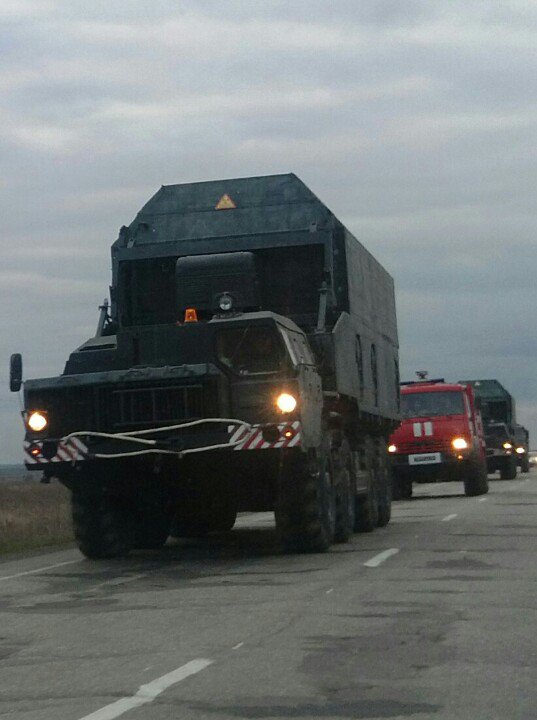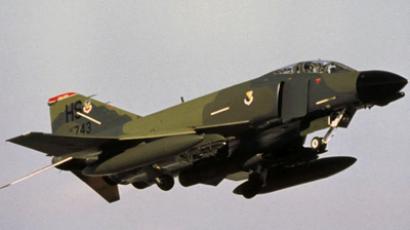Russia Moves Nuclear Warheads Near Tatishchevo
Tatishchevo is in Saratov Oblast in central Russia
Warhead carriers reportedly moving NW from Saratov. Across the Volga to the southeast is Engles strategic bomber base. Moving to or from?
Russian
man photographs convey of what he says were Russian war heads head to
Tatishevo. Topol-m warheads maybe. Russia seems to be preparing in
the event the US Coalition attacks Syria drawing Russia into direct
confrontation. NATO seems to be playing chicken with Russia and
Syria, trying to get them to shoot down a NATO war
plane.
Links
http://www.wsj.com/articles/u-n-membe...
https://twitter.com/StratSentIntel/st...
https://www.rt.com/news/363658-un-ale...
https://www.rt.com/news/363579-syria-...
https://sputniknews.com/middleeast/20...
http://www.infowars.com/top-british-g...
http://www.wsj.com/articles/u-n-membe...
https://twitter.com/StratSentIntel/st...
https://www.rt.com/news/363658-un-ale...
https://www.rt.com/news/363579-syria-...
https://sputniknews.com/middleeast/20...
http://www.infowars.com/top-british-g...
Farnaz
Fassihi,
Wall Street Journal October 21, 2016
The
U.N.'s General Assembly met informally to discuss whether to take
steps to override the Security Council on the Syrian conflict, as the
council remains deadlocked over how to bring an end to the bombing of
northern city of Aleppo
The
UN Human Rights Council has voted to start an independent special
inquiry into the situation in the war-ravaged Syrian city of Aleppo,
indicating that the blame for most of the civilian casualties lies
with Syria and Russia.
A
resolution aimed at reviewing alleged human rights violations in
Aleppo was introduced by Britain and its Western and Arab allies. The
document was approved Friday, with Russia and China voting against
the draft.
The
council has requested that the International Commission of Inquiry
"conduct a comprehensive independent special inquiry into the
events in Aleppo." It also urges the body to identify and bring
to justice those responsible for the alleged abuses.
A
resolution aimed at reviewing alleged human rights violations in
Aleppo was introduced by Britain and its Western and Arab allies. The
document was approved Friday, with Russia and China voting against
the draft.....
In
a statement, the Syrian Defense Ministry accused Turkey of“flagrant
aggression, which targeted innocent citizens,” saying
that it considers it “a
dangerous development that could escalate the situation.”
Since
the beginning of the Syrian conflict in 2011, tensions have been on
the rise between the two neighboring countries, with Ankara backing
armed rebels opposing the legitimate Syrian government. On several
occasions, shelling from heavy fighting spilled over the border and
into Turkey, further inflaming the situation.
Syriawarns it will ‘down Turkish planes next time,’ calls bombing of Kurds ‘flagrant aggression’
Damascus
has reacted harshly to the bombing of Kurdish militias in northern
Syria on Thursday morning by Turkey’s air force, vowing to
intervene next time Ankara sends its planes over its border.
“Any
attempt to once again breach Syrian airspace by Turkish war planes
will be dealt with and they will be brought down by all means
available,” warned
Damascus, whose planes, which have flown in concert with a Russian
expeditionary force, have been avoiding direct confrontation with
unauthorized NATO jets.
Turkish
artillery guns have been firing at Kurdish militias, who are now
fighting against Ankara-backed rebels over territory won back from
Islamic State in northern Turkey on Wednesday. Turkey said that the
airstrikes took out up to 200 Kurds, though the YPG, the Kurdish
militia, initially put its losses at 15.
Syria
called the victims “150
innocent civilians” and
said that “these
irresponsible acts will have dire consequences that will threaten the
region's stability and security.”
The
US, Turkey’s NATO ally, has meanwhile distanced itself from the
airstrikes, with State Department spokesperson John Kirby tweeting on
Thursday that “contrary
to some reports, US was not involved in Turkey airstrikes last
night.”
Kirby
added that US “called
on all parties on the ground to avoid uncoordinated
movements,” adding
that they “only
benefit” Islamic
State terrorists.
Turkish
aerial incursions into Syria have grown more frequent, as fighting
has intensified around Aleppo, with at least four factions vying to
take control of northern Syria, all with their own agendas.
In
June 2012, Syria downed a Turkish military jet on reconnaissance
mission over Syrian territorial waters 1 kilometer from its coast.
While Syria insisted that it was acting in defense of its borders,
Ankara accused it of breaching international law. Turkey later
confirmed that the jet did enter into Syrian airspace by mistake but
claimed that it was shot down in international airspace after it had
left Syrian territory.
In
August, the Turkish army supported by Syrian rebels launched a
ground intervention into Syrian territory, aiming to liberate the
Kurdish border town of Jarablus from Islamic State, which had held
the city since July 2013. Damascus condemned the incursion as a
violation of its sovereignty, while the Kurds accused Turkey of
unleashing a “war” on
Kurdish militias who wanted to retake the town from terrorists.
Aleppo’s 'Humanitarian Pause': Militants Launch Mortar Attack on Civilians
The
first day of the “humanitarian pause” in Syrian Aleppo did not
lead to any desired results. Following the halt in the airstrikes,
the terrorists in turn responded with mortar fire.
The humanitarian corridors,
which offered a route for civilians and militants with weapons to
pass through, came under mortar attack. Due to that only about ten
people were able to leave the city instead of planned 7,000
civilians.
The “humanitarian pause” in attacks was introduced in
Aleppo at 08:00 local time (05:00 GMT) on Thursday to ensure the safe
evacuation of unarmed militants and civilians from eastern Aleppo via
eight designated corлridors.
Earlier in the day, Russian Defense
Minister Sergei Shoigu announced that Moscow had decided to extend
the humanitarian pause in Aleppo for another 24 hours.
RIA
correspondent, Mikhail Alaeddin was present on the ground in Aleppo
and witnessed the evacuation before the “humanitarian pause” was
implemented.
Successful preparation
According to the correspondent,
the Security Service, police and civil defense officers began to
prepare for a “humanitarian pause” a few days before the
scheduled time.
The place from where the civilians and insurgents
were supposed to leave had a festive atmosphere.There were
fluttering national flags attached to the vehicles, policemen were
smiling and a few hundred meters behind the cordoned area there were
ordinary citizens gathered hoping to see how the evacuation proceeds.
Near the corridor there were many buses with curtained windows and
many ambulances.
Alaeddin noted that the
authorities hoped that the militants and citizens will come out
earlier ahead of the scheduled time because the residents of Aleppo
were sent daily messages on their mobile phones in order to inform
them about the timing of the implementation of the “humanitarian
pause.”
“Militants! Amnesty is guaranteed to you. Enough of blood
shed of your compatriots. Lay down your weapons, come out and you
will save your life and the lives of others,” Alaeddin read the
message which he received on his phone.
“I think today will be the
beginning of the end of the battle for Aleppo, I know that many
people want to go out and militants want to give up. I feel we will
have a good day,” officer of the Syrian Army, Iyad, told the
correspondent in a comment.
According to the correspondent the drive
to the corridor was extremely difficult. However, in the district
close to the designated corridor, the atmosphere was electrifying.
There were farmers who had set up their stalls selling vegetables and
fruits. A large number of cars were trying to squeeze through the
people and sirens were blazing loudly.
Mine attack out of nowhere
The
first hour passed without any events but then suddenly the mood began
to visibly deteriorate. Mortar fire flew out of nowhere. People
started moving under cover in order to avoid getting hit.
Alaeddin
describes hiding in the nearest shelter with an officer and within
the next hour, six more mortar attacks occurred at different
distances.
“I take it back. I think no one is coming because the
terrorists are ready to attack and no one will be allowed to come
out,” Iyad exclaims from under cover.
According to the correspondent, the position of the
militants from where they were attacking, was quite close to the
evacuation corridor, only 200-300 meters way.
The security officer
decided to take the car and the ambulance to a safe distance. Using
the loudspeakers, the military asked the citizens not to come any
closer to the corлridors.
The north is silent
Alaeddin with his team
and officers had to leave the district and head toward the north, to
the Castello highway. There were a few humanitarian corridors over
there as well which the team wanted to make sure were not under
attack.
As they left the city, the correspondent described seeing a
lot of journalists, representatives of civil defense and police
gathered together.
Shortly afterwards, information was received
suggesting that a group of militants has asked to be allowed to leave
through the corridor in Castello, provided that no one would search
them and they would be given several vehicles with first aid to care
for their wounded.
The police and the Syrian officers started fussing
trying to reach an agreement. They gave their intermediary consent
through a middle man and a group of doctors and civil defense made
their way toward the defense route.
The journalists upon hearing this arrangement
prepared cameras and written material, ready to tell the whole world
about extraction of the first group of militants.
Half an hour later
hope died once again and the group returned with nothing. The
arrangement did not work out.
Humanitarian pause ends with firing
The
situation in the Bustan al-Qasr district is constantly volatile. The
militants opened mortar fire again as soon as the Sunni religious
leaders asked civilians and militants to leave the territory of the
radicals using a speaker.
This time the mortar fire fell near the
soldier’s shelter and one of the soldiers received shrapnel wounds.
His comrades immediately rushed to help him and put him in an
ambulance.
Just a few minutes later, in short intervals, groups of
two to three people started coming to the main checkpoints. According
to the correspondent, the wounded militants belonged to Ahrar al-Sham
radical group.
Only about ten people showed up with the militants
asking to be to send to Idlib.
After helping the victims with the required medical treatment
as per the agreement, the militants were provided with a minivan and
given a safe passage to leave this side of Idlib to go to Aleppo.
The
correspondent explained that the militants were firing using small
artillery and also from heavy machine guns.
Alaeddin said that on the
spot where just fifteen minutes ago there were journalists and
ambulances now there was no one. Then, the military that was
responsible for this stretch of the road was left behind together
with the RIA correspondent and several of his Russian colleagues.
Everyone else left.
“So much for the ‘humanitarian pause’ and
the terrorist’s response to it. Now I think no one will leave. It
is time to go home and maybe tomorrow will be a different day,”
Iyad told the RIA correspondent.



 S2 Intel
S2 Intel












No comments:
Post a Comment
Note: only a member of this blog may post a comment.